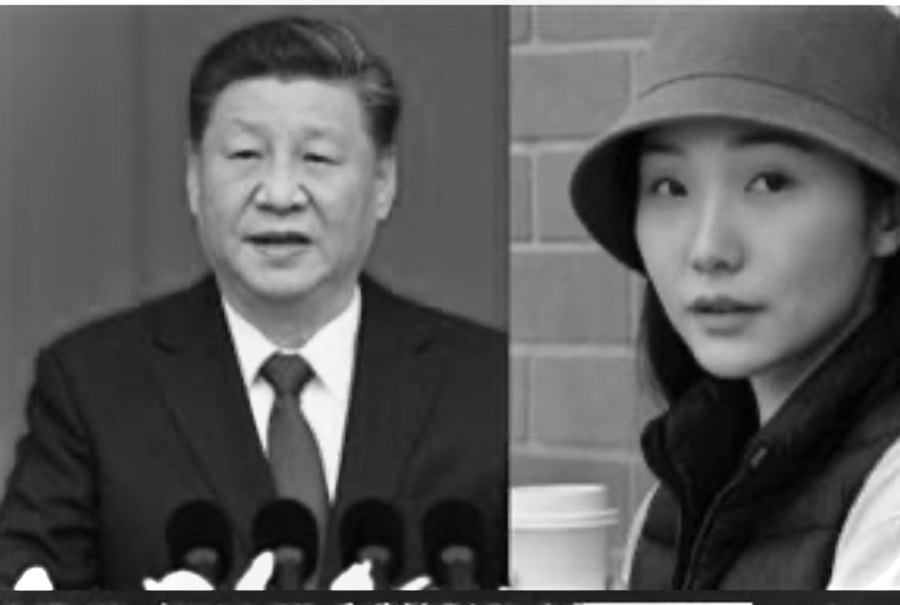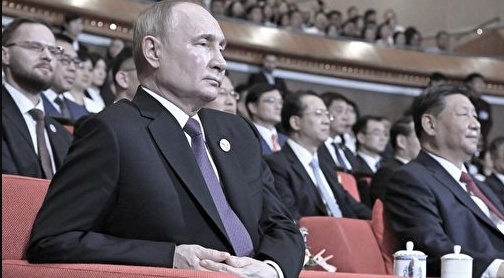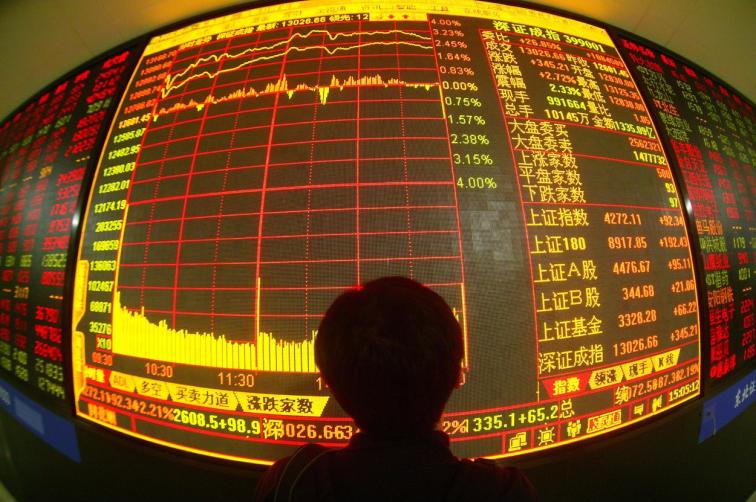A post on X claimed that Yang Lanlan’s real name is Xi Minglan, and that she is Xi Jinping’s illegitimate daughter. (Online image)
[People News] After 23-year-old heiress Yang Lanlan caused a car accident in Australia while driving drunk, her immense wealth sparked speculation about her identity. Based on many suspicious details, netizens strongly suspect that Yang is related to Xi Jinping’s family. Whether or not this is true remains unconfirmed, but the question arises: just how much wealth does the Xi family possess? To understand this, one must look at the rise of Xi Jinping’s eldest sister, Qi Qiaoqiao.
Xi Zhongxun and his second wife Qi Xin had four children: eldest daughter Qi Qiaoqiao, second daughter Qi An’an, son Xi Jinping, and youngest son Xi Yuanping.
After the 18th Party Congress, with their mother Qi Xin ageing, family meetings of the Xi clan were chaired by Qi Qiaoqiao, whom Xi Jinping designated as the “head of the household.” In family affairs, her authority is paramount — even Xi himself defers to her.
An article signed by Gao Xiaoyu once reported on Qi Qiaoqiao. According to one of Qi Qiaoqiao’s close friends, the four Xi siblings were deeply affectionate toward one another; as children they often stayed up all night talking and joking together. During the Cultural Revolution, when schools were closed, Qi Qiaoqiao was in her first year of high school, Qi An’an was in middle school, and Xi Jinping had just graduated from primary school. Xi Jinping looked up to his elder sister, who was in high school, with great admiration. According to an insider, since the Qingming Festival family meeting in 2013, every such gathering has been presided over by Qi Qiaoqiao.
Born in 1949, Qi Qiaoqiao moved to Beijing with her father at the age of three and entered the Beihai Kindergarten. In her memory, the happiest days of her childhood were those spent with her parents—listening to their stories and playing games together.
In the autumn of 1962, Xi Zhongxun was purged, so Qi Qiaoqiao experienced the chill of the Cultural Revolution’s ten years of turmoil earlier than most. During the Cultural Revolution, her father was imprisoned and his whereabouts were unknown. Her mother was labelled as someone who “failed to draw a clear line with her husband” and was dragged out for public denunciation and struggle sessions. When her mother came home after a beating, with her younger siblings crying in a heap, the very first words out of Qi Qiaoqiao’s mouth were: “Mama, did you say anything wrong? You must not become a traitor (who betrays Dad)!”
In the early spring of 1969, when the movement of sending educated youth to the countryside began, Qi Qiaoqiao first went to Urad Front Banner in Inner Mongolia, and later to a rural area near Tongliao, where she stayed for six and a half years. During those harsh years, the young Qi Qiaoqiao developed severe arthritis, suffered a relapse of tuberculosis, and contracted rheumatic fever. On one occasion, while burning with a fever from dysentery and unable to work in the fields, she still had to fill several large water jars for the production team. Dizzy and faint, she nearly fell into a jar. She later recalled: “At that time, life had become so bitter that people were no longer even afraid of death.”
Qi Qiaoqiao’s contributions to the family came in two main moments:
In October 1976, after the fall of the “Gang of Four,” Xi Zhongxun was still undergoing labour reform in Luoyang. At that time, Qi Xin (his wife) saw that many veteran cadres who had suffered persecution were being reinstated, while Xi Zhongxun’s case remained unresolved, which left her extremely anxious. Accompanied by Qi Qiaoqiao, she travelled repeatedly between Beijing and Luoyang, making several attempts to seek help from Vice Premier Wang Zhen.
According to popular accounts, in the second half of 1977, in order to secure the political rehabilitation of her father, Qi Qiaoqiao went again to look for Wang Zhen. The guards would not let her into his residence, so she waited nearby until Wang Zhen’s car passed, then rushed out to stop it and handed him a personal letter written by Xi Zhongxun to the Party leadership. This created the opportunity for Xi Zhongxun to be rehabilitated. It was regarded as Qi Qiaoqiao’s greatest service to the Xi family.
Because Xi Zhongxun supported Hu Yaobang and even suggested that Deng Xiaoping retire, by 1990, when Xi was nearly eighty years old, he was banished to Guangdong. There, he and Qi Xin lived for nearly twelve years in the “Lan Yuan” compound of five villas within the Shenzhen Guesthouse. At that time, Qi Qiaoqiao was already the youngest deputy division-level officer in the People’s Armed Police. But in order to take care of her ageing parents, she voluntarily retired from the military and remained by their side. In 2002, when Xi Zhongxun passed away at the age of 89, Qi Qiaoqiao was 53. This was considered her second great service to the Xi family.
After Xi Zhongxun’s death, his widow Qi Xin worried that Qi Qiaoqiao’s family would lack financial security in the future. She wrote a letter to the national leadership at the time, essentially requesting that Qi Qiaoqiao be reinstated to her former post so she could return to work. But Qi Qiaoqiao declined. At 53, she decided instead to formally throw herself into the great tide of commerce.
Because she had spent so many years at home caring for her parents, and had previously spent most of her life within the Party system, Qi Qiaoqiao actually had very limited knowledge of business—far less than her younger brother Xi Yuanping. In the world of commerce, she mainly relied on her second husband, Deng Jiagui.
During her time as a sent-down youth in Inner Mongolia, Qi Qiaoqiao met Zhang Esheng, a fellow educated youth from Beijing. The two married there and had a daughter, Zhang Yannan. After Xi Zhongxun was politically rehabilitated, Qi Qiaoqiao followed her father south as his secretary. From then on, she and her first husband lived largely apart. When Xi Zhongxun was later transferred back to work in Beijing, Qi Qiaoqiao returned to the capital with him and was assigned a military position. During her tenure as the “youngest deputy division-level officer in the People’s Armed Police,” she and her first husband finalised their divorce.
While accompanying the retired Xi Zhongxun in Guangdong, Qi Qiaoqiao met Deng Jiagui, a businessman who had made a fortune in the tobacco trade in Yunnan.
In 1991, a year before Deng Xiaoping’s Southern Tour ignited China’s nationwide commercial boom, Deng Jiagui had already purchased an apartment in Hong Kong’s Braemar Hill Gardens (then a British colony) for HK$3 million, and presented it to Qi Qiaoqiao as a token of love. The two married in 1996. From that point on, Deng Jiagui became both the stepfather to Qi’s daughter Zhang Yannan and the financial backer for Qi Qiaoqiao’s ventures.
The Chinese-language media program Sino-Japan Political Economy Commentary introduced Qi Qiaoqiao and Deng Jiagui as a quintessential political-business power couple, describing how they kept pace with the times and built their business empire.
Although it was her first time formally entering the business world, Qi Qiaoqiao was not unfamiliar with commerce; her years caring for her father had not prevented her from dabbling in business. Deng Jiagui, on the other hand, had long since “gone to sea” (left the system for business) and was a seasoned entrepreneur. Qi Qiaoqiao managed the political connections and oversight, while Deng Jiagui handled business strategy. Together, they focused heavily on three sectors: real estate, mining, and the stock market.
According to Hong Kong media, as early as the 1990s, Xi Jinping’s elder sister Qi Qiaoqiao, in the capacity of a Hong Kong investor, was already engaged in highly profitable real estate development in Beijing and Shenzhen. She established Beijing Zhongminxin Real Estate Development Co., Ltd., serving as chairwoman, while her husband Deng Jiagui was general manager. Together, they developed luxury projects in prime areas of Beijing, one of which was named “Guanyuan.”
According to data from the Beijing Municipal Land Resources Bureau, in 2004, the developer obtained over 10,000 square meters of land for Guanyuan at a cost of 95.6 million yuan. By June 2012, one 189-square-meter, three-bedroom apartment in Guanyuan was listed online for 15 million yuan, with a per-square-meter price of 79,365 yuan.
In October 2009, Hong Kong’s Next Magazine exposed two real estate transactions involving Xi Jinping’s relatives. The first, in early 2009, was a luxury home worth HK$150 million, whose buyer was linked to Zhang Yannan, in partnership with Beijing Zhongminxin general manager Deng Jiagui, whose wife is Qi Qiaoqiao. The second was another luxury home transaction in August 2010, reportedly also purchased by a relative of Xi Jinping.
Overseas media also reported that at least ten real estate companies have been registered under the names of Deng Jiagui or Qi Qiaoqiao.
Together, the couple partnered with Shenzhen Metro to establish Shenzhen Metro Yuanwei Real Estate Company, which focused on developing properties above metro lines. They acquired large tracts of scarce land resources and then sold them to other developers.
Later, when Vanke acquired Shenzhen Metro’s projects, these land assets were injected into Vanke’s listed company, allowing shareholders to exchange them for publicly traded shares.
In mining, the couple, through Shanghai Wangchao Company, invested in Jiangxi Rare Metals Tungsten Holdings, acquiring an 18% stake.
This Jiangxi tungsten company originated from the Chinese Tungsten Mining Company, founded during the Soviet-era revolutionary base, often called the first state-owned enterprise of the CCP. It holds vast, rare-earth resources of immense value.
Then, State Councillor Wang Yong once visited Jiangxi specifically to inspect this enterprise. The current Party Secretary of Qinghai Province, Wu Xiaojun, first built trust with Qi Qiaoqiao while overseeing work related to this company in Jiangxi, eventually winning her endorsement.
As Xi Jinping has in recent years tightened control over rare earth production and exports, the value of these resources has only grown.
In equity investment, Qi Qiaoqiao’s primary platform was the well-known Yuanwei Investment. Later, due to its high profile, it partnered with CCB International (a subsidiary of China Construction Bank) to form CCB Yuanwei.
The person in charge of this cooperation on the CCB side was then–head of the equity division, Li Yunze. Through this connection, Li was later recommended to become director of the newly created National Administration of Financial Regulation, making him the first official born in the 1970s to reach ministerial rank.
Through many hidden entities, Qi Qiaoqiao and her family also invested in a variety of companies, including Shanzhinong and Xinlian Electronics, among others.
After Xi Jinping took power in 2013, in order to avoid giving his political rivals any leverage, he once again strictly demanded that his family withdraw from all business activities.
Qi Qiaoqiao sold her stake in CCB Yuanwei for 15 million yuan to the well-known financial conglomerate Tomorrow Group. This transaction was completed after Bloomberg published its 2012 article on the Xi family’s wealth.
However, whether Tomorrow Group’s hidden controller, Xiao Jianhua, paid anything beyond the 15 million yuan cannot be proven. Given Xiao’s usual practices, it is almost certain he would not have let the Xi family take a loss.
Qi Qiaoqiao’s daughter, Zhang Yannan, was also deeply interested in equity investment. Under her own name, she invested in the company of one of her mother’s EMBA classmates, He Kang Variable Frequency Co.. Within three years, its value increased more than 40-fold, and the company later appeared among the shareholders of Wanda Commercial Properties.
Zhang Yannan was also fond of purchasing luxury real estate in Hong Kong. Seven properties linked to her have been exposed, valued at HK$350 million.
What was little known is that Deng Jiagui was also a hidden shareholder of Excellence Group, holding nearly 50% of its equity. This company once ranked 25th among Chinese real estate enterprises, and was known as the “king of office buildings” in Shenzhen’s CBD. Its landmark projects included Excellence Century Centre, Excellence Times Square, and Excellence Tower in the Futian District. Even Vanke Group could not compete with them. Moreover, their method of land acquisition in Shenzhen was not the standard public auction, but through direct negotiation (agreement transfers)—a method highly favoured for rent-seeking through political connections.
Excellence Group’s chairman, Li Hua, graduated from South China University of Technology, worked at the Shenzhen Communist Youth League Committee, and later left government service to found the company.
According to estimates from the Hurun Rich List, even after the real estate market collapsed in recent years, by 2024, Li Hua’s personal fortune was still over 65 billion yuan. This suggests that Deng Jiagui’s 50% stake in Excellence alone would be worth over 60 billion yuan. Adding in other assets, the Qi Qiaoqiao family’s wealth is estimated to exceed 100 billion yuan.
Within the CCP officialdom, many people, aware of Qi Qiaoqiao’s authority within the Xi family, went to great lengths to curry favour with her, hoping for protection in times of need.
Prominent figures such as Lai Xiaomin, Sun Zhengcai, Xu Jiayin, Wang Jianlin, and Xiao Jianhua all paid enormous sums to Qi Qiaoqiao and Deng Jiagui—sometimes by offering them cut-rate equity stakes, sometimes by selling them real estate far below market value, or by purchasing their companies at inflated prices. But when these tycoons later fell into trouble, believing that “a tall tree offers good shade,” the “tree” was nowhere to be found.
(First published by People News)










News magazine bootstrap themes!
I like this themes, fast loading and look profesional
Thank you Carlos!
You're welcome!
Please support me with give positive rating!
Yes Sure!